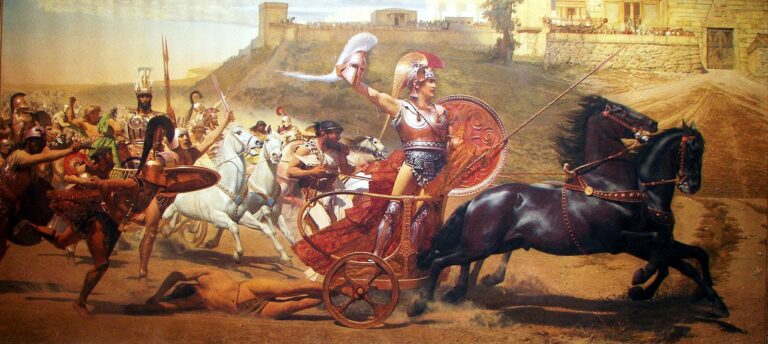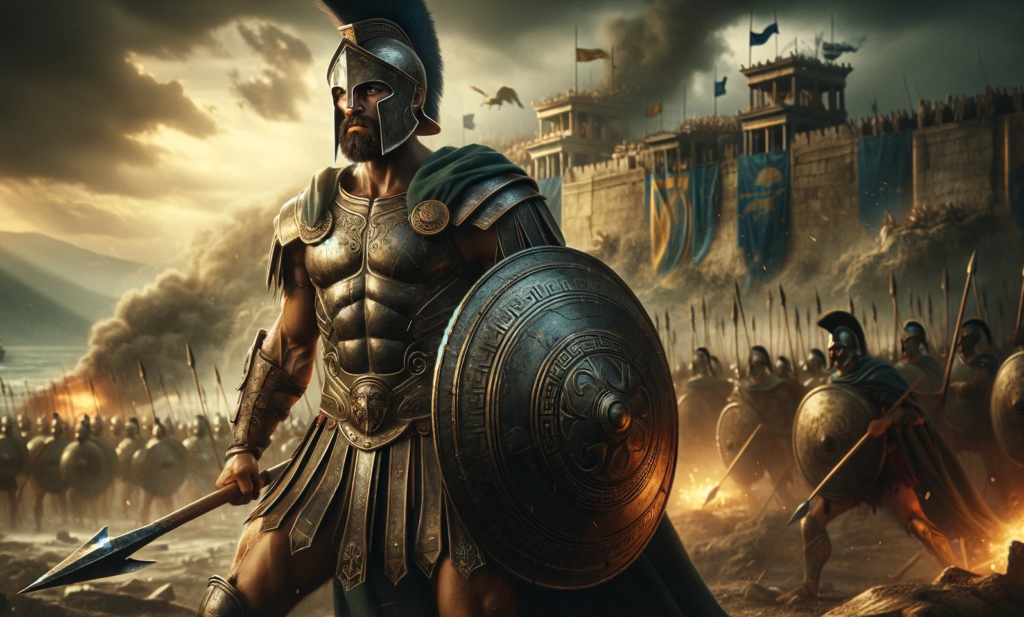Meaning of Achilles
Greek Origin
Achilles is a masculine given name of Greek origin, renowned for its association with the legendary hero Achilles from Homer’s epic poem The Iliad. The name carries profound historical and cultural significance, embodying themes of courage, strength, and ultimately, mortality.
Linguistically, Achilles derives from the Greek word (Achilléus), which is believed to be connected to the verb (akhles) meaning “to hurt or grieve.”
There are several proposed etymological interpretations:
- “Strong as a healer”: This interpretation links Achilles’ name to his vulnerability, suggesting a paradox where his immense strength was coupled with a fatal weakness.
- “Whom pain will seize”: This etymology emphasizes the tragic aspect of Achilles’ story, foreshadowing his eventual demise at the hands of Paris.
Regardless of the precise origin, the name Achilles has transcended its literary roots to become a global symbol of heroism and tragedy. Its enduring popularity is a testament to the timeless power of Homer’s epic narrative and the archetypal figure of Achilles himself.
Beyond literature and mythology, the name has made appearances in various fields:
- Art: Paintings, sculptures, and other artistic works often depict Achilles, showcasing his iconic portrayal as a powerful warrior.
- Music: Composers have drawn inspiration from Achilles’ story, creating musical pieces that explore themes of heroism, love, and loss.
- Film and Television: Achilles has been featured in numerous films and television adaptations, both classical and contemporary interpretations.
Epithet: “Achaean”
Achilles
is one of the most famous names in Greek mythology, synonymous with heroism, strength, and ultimately, tragic downfall.
The name’s meaning is believed to derive from the word akhilleion, meaning “tormentor” or “grief.” This reflects the immense sorrow and suffering that Achilles’ fate brings upon his family and comrades.
His epithet, “Achaean”,
holds significant historical context. It designates him as a warrior belonging to the Achaeans,
an ancient Greek confederation of city-states that participated in the Trojan War. The Achaeans were led by Agamemnon, and their campaign against Troy spanned ten years.
Achilles’ “Achaean” identity highlights his central role in this epic conflict. He embodies the strength and resilience of the entire Achaean force, standing as a symbol of their collective struggle against the mighty Trojans.
Furthermore, the epithet underscores the historical significance attached to Achilles.
By linking him to the Achaeans, his story becomes interwoven with the broader narratives of ancient Greece, its military expeditions, and its cultural heritage.
Origin Story & Mythology
The Prophecies
The name “Achilles” holds a profound significance within Greek mythology, carrying with it tales of heroism, destiny, and tragic downfall.
Originating from the Ancient Greek Ἀχιλλεύς (Akhilles), the name’s etymology is shrouded in mystery. Some scholars propose connections to the root word “akhein,” meaning “to hurt” or “to pain.” This interpretation aligns with Achilles’ fate, a hero destined for an untimely death.
Others suggest links to “akhileus,” meaning “swiftest,” alluding to Achilles’ exceptional speed and agility in battle.
Within the context of Greek mythology, Achilles is depicted as a legendary warrior, son of the mortal king Peleus and the sea nymph Thetis. His story is deeply entwined with the Trojan War, a conflict immortalized in Homer’s epic poems, The Iliad and The Odyssey.
According to legend, Thetis sought to ensure her son’s immortality by dipping him into the River Styx. She held him by his heel, which remained dry, thus becoming his vulnerable spot—the “Achilles’ heel.”
The prophecy surrounding Achilles’ life foretold that he would either live a long but uneventful life or die young in battle at Troy.
Driven by ambition and a thirst for glory, Achilles chose the latter path. His extraordinary strength and prowess made him a formidable force on the battlefield, single-handedly turning the tide of war against the Trojans.
However, his wrath ignited when Agamemnon, the Greek commander, dishonored him by taking away Briseis, his captured war prize.
Achilles withdrew from battle, leading to a period of hardship for the Greeks. He ultimately returned to avenge the death of his close friend Patroclus, slain by Hector, prince of Troy.
In a climactic duel, Achilles slew Hector, dragging his body around the walls of Troy as a testament to his revenge.
Achilles’s fate was ultimately sealed when Paris, aided by the god Apollo, shot him with an arrow that struck his vulnerable heel, fulfilling the prophecy.
Achilles’ Mother’s Attempt to Save Him
Achilles’ story is steeped in Greek mythology, with his name echoing through millennia as a symbol of both exceptional prowess and tragic vulnerability.
According to Homer’s epic poem, The Iliad, Achilles was the son of Peleus, a mortal king, and Thetis, a sea nymph. His birthright was destined for greatness, but also foreshadowed by an unavoidable doom.
Thetis, determined to protect her son from death in war, sought a way to render him invulnerable.
Legend has it that she dipped the infant Achilles into the River Styx, whose waters were believed to grant immortality. However, she held him by his heel as she submerged him, leaving this single point exposed.
The tale of Thetis’ attempt to save Achilles highlights a common theme in mythology: the struggle against fate.
Despite her best efforts, Achilles’ vulnerability remained, leading to his eventual demise at the hands of Paris, who struck him with an arrow aimed at his vulnerable heel, fulfilling the prophecy.
The name “Achilles” itself likely derives from the ancient Greek word Ἀχιλλεύς (Akhillēus), which is connected to the verb ἀχίλλειν (akhillein) meaning “to rend,” or “to tear.”
This connection reinforces the tragic irony of his story – that a hero revered for his strength and courage ultimately fell victim to a seemingly insignificant weakness.
Fateful Dip in the River Styx
The name Achilles holds a prominent place in Greek mythology and its cultural legacy. Its origins trace back to the epic poems of Homer, The Iliad and The Odyssey, which weave tales of ancient heroes and gods.
In these narratives, Achilles is portrayed as the greatest warrior of the Greeks during the Trojan War. His story is a poignant exploration of fate, glory, and the complexities of human nature.
According to Greek mythology, Achilles was the son of the mortal Peleus, King of the Myrmidons, and Thetis, a sea nymph. To ensure his immortality, Thetis dipped him into the River Styx, the mythical river that separated the world of the living from the underworld. She held him by his heel, as this was the only part of his body not submerged in the water.
This fateful dip in the River Styx granted Achilles extraordinary strength and invulnerability, rendering him practically invincible except for his vulnerable heel – his Achilles’ heel. The story illustrates a profound truth: even the most formidable individuals have weaknesses that can be exploited.
The name Achilles itself is derived from the Greek word “Ἀχιλλεύς” (Akhillēs).
Several theories attempt to shed light on the meaning of this name:
- One theory suggests that it means “painful,” alluding to the grief and pain caused by his eventual demise.
- Another proposes that it comes from the word “ἀχλῆς” (achlēs), meaning “sharp” or “pointed,” possibly referring to the sharpness of his intellect or the piercing nature of his gaze.
Over time, the name Achilles has transcended its mythological roots to become a part of the English language. It is often used metaphorically to describe individuals who possess great strength but have a fatal flaw. The legend of Achilles serves as a timeless reminder of the fragility of life and the enduring power of storytelling.
Historical Legacy & Cultural Impact
Legacy in Art and Literature
Achilles’s legacy transcends his mythical status as a Greek hero; it has permeated history, art, literature, and even language itself, becoming a potent symbol across cultures.
His story, immortalized in Homer’s Iliad, resonated deeply with audiences then and now. He embodied both the glory and tragedy of war, displaying superhuman strength, unwavering courage, and yet ultimately succumbing to fate. This paradox—the invincible hero felled by a seemingly insignificant weakness (his vulnerable heel)—has captivated imaginations for millennia.
In literature, Achilles serves as a model and a cautionary tale. His wrath, ignited by Agamemnon’s dishonor, highlights the destructive power of pride and anger, while his love for Patroclus underscores the depths of human emotion. Writers from Shakespeare to Tennyson have drawn inspiration from Achilles, exploring themes of heroism, fate, love, and loss through his lens.
Art has also been profoundly influenced by Achilles’s story. Ancient Greek pottery and sculptures depict him in dynamic poses, wielding his spear and facing formidable foes. Renaissance masterpieces like Michelangelo’s “The Dying Slave” evoke the tragic beauty of Achilles’s final moments. Modern interpretations continue to explore the myth, offering diverse perspectives on his character and legacy.
Achilles’s name itself has become synonymous with exceptional ability, resilience, and ultimately, vulnerability. The term “Achilles’ heel” is universally understood as a metaphor for a hidden weakness, reminding us that even the mightiest individuals have limitations.
The enduring impact of Achilles lies in his archetypal status. He represents not just a hero from ancient Greece, but a timeless symbol of human nature—our capacity for greatness, our flaws, and our enduring struggle with fate and mortality.
Psychological Analysis of Achilles’ Character
Achilles, a name synonymous with both unparalleled strength and tragic vulnerability, has resonated through millennia, transcending its origins to become deeply embedded in cultural consciousness. Born from Greek mythology, the story of Achilles, the legendary hero of the Trojan War, offers profound insights into human nature and the enduring power of narrative.
The name Achilles derives from the ancient Greek word “Ἀχιλλεύς,” which likely connects to the verb “akhein,” meaning “to hurt” or “to harm.” This linguistic root foreshadows the tragic fate that awaits Achilles, highlighting the inherent duality within his character: immense power juxtaposed with fatal weakness.
Achilles’ psychological analysis reveals a complex tapestry of conflicting emotions and motivations. His superhuman strength stems from his divine mother, Thetis, who dipped him in the River Styx to render him invulnerable. This bestowed upon him a sense of invincibility, fueling his arrogance and thirst for glory. However, Thetis’ grip on his heel, which remained dry during the dip, represents his vulnerability, ultimately becoming his point of weakness.
Driven by hubris – an excessive pride in his abilities – Achilles displays a ruthless streak throughout the Trojan War. He relishes in combat, taking pleasure in inflicting pain and death upon his enemies. This thirst for glory manifests in his withdrawal from battle when Agamemnon dishonors him, showcasing the immense emotional weight placed on his reputation.
Despite his flaws, Achilles possesses undeniable qualities of heroism. His unwavering loyalty to his comrades, his fierce determination in battle, and his profound grief over Patroclus’ death demonstrate a deep capacity for love and compassion. He ultimately returns to the battlefield driven by vengeance, but his rage is tempered with a poignant understanding of mortality.
Achilles’ story has had a profound cultural impact throughout history, shaping artistic representations, philosophical debates, and even influencing modern language. His name has become synonymous with both exceptional talent and tragic downfall. The concept of the “Achilles’ heel” itself serves as a metaphor for any inherent weakness, reminding us that even the seemingly invincible can be brought low.
The enduring legacy of Achilles lies in his ability to embody the complexities of the human experience. He is a figure who inspires awe and pity in equal measure, serving as a timeless reminder of the fragility of life and the power of storytelling to illuminate the depths of human nature.
- Best LeadsGorilla Alternatives for 2025 - April 26, 2025
- Best Overloop Alternatives for 2025 - April 25, 2025
- Best Lead411 Alternatives for 2025 - April 25, 2025


